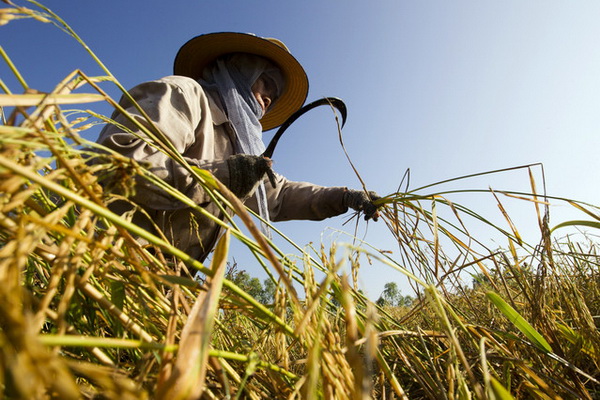


A laborer harvests rice from a field in Surin, Thailand.
Source: Bloomberg
Feb 22, 2013
By Anchalee Kongrut,a journalist from the Bangkok Post who is on exchange with the Economic Observer
I am always upset every time I see leftover food. Such agitation might be a result my traditional Thai upbringing.
In the past, many Thai children were forced to read a poem about the toiling farmers who cultivate rice for them to eat. One memorable line from this poem is: "Every time you eat those grains of rice, remember you are taking in our toiling, the smell of our perspiration makes you grow."
It's such a powerful line, that as a child, I ate my rice with a sense of both fear and gratitude.
As Thailand is a major rice producer and exporter, many Thais have developed a special feeling for the staple grain.
Some believe that there is special deity associated with rice. Known as "Mae Posop" or the "Rice Mother," we are taught to believe that throwing away rice is disrespectful to the goddess who in turn may inflict punishment by removing rice from our plates and families. Children are scolded when they cannot finisht the rice on their plates.
Needless to say, I was startled in China to see people leaving food on plates. As a country that so recently endured on of the worst famines in history, I was perplexed how a people that had lived through such a tragic experience could so suddenly transform into a nation that was so willing to waste food.
I was told by my Chinese friends that the Chinese have not forgetton the famine. On the contrary, this experience led to a strong new urge to give display to abundance.
But it's not really fair to say that only the Chinese waste food. Food waste is a global problem that effects every country.
An average family of four in the U.S spends $500-2,000 a year on food that ends up in the bin, according to a recent report in The Wall Street Journal.
The European Parliament warned last year that 50 percent of food in Europe was left unconsumed.
Despite Thailands traditions, it's no longer doing much better than other countries. Since all-you-can-eat buffets became popular in Thailand over the past 30 years, the food consumption habits of Thais has changed.
The good news is the world has become more aware of the problem.
Recently, China's leaders and state media have begun to focus public attention on the problem.
Soon-to-be president Xi Jinping has criticized the "wasteful habit" among officials and others have even called for restaurants to levy fines on customers who leave too much food uneaten.
In Thailand, some schools have also begun to pay attention to this problem. There are more and more campaigns aimed at educating the public, especially the younger generation, about how food is produced, in an attempt to instill more respect for the amount of energy and resources that is needed.
Instead of stories about a vengeful Mae Posop, young Thais are now encouraged to finish their rice by being told the tale of how thier food makes it onto their table.
It's hoped that once young people are better informed about where their food comes from, they won't be so willing to throw things away.